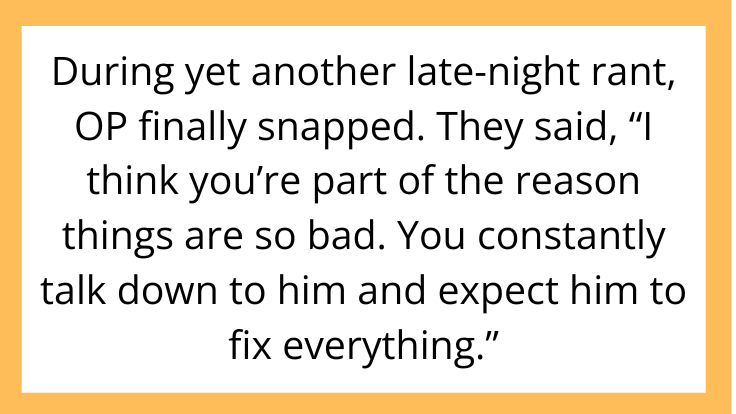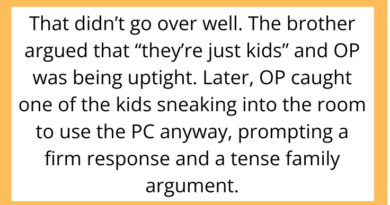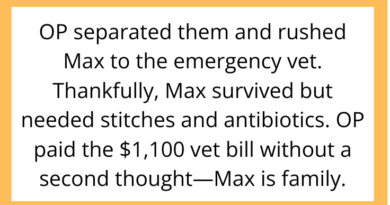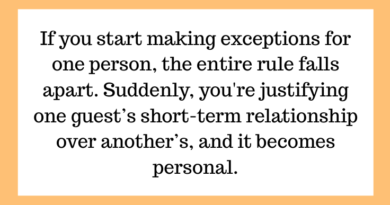AITAH for Telling My Best Friend She’s to Blame for Her Failing Marriage?
Last week, I came across a thought-provoking post on r/AITAH that ignited an intense discussion about friendship, honesty, and the fine line between support and judgment. The poster asked if they were the bad guy for telling their best friend—during a heated argument—that she was responsible for her crumbling marriage.
This scenario resonated with thousands of readers because it forces us to confront an uncomfortable question: When someone we love is in pain, do we tell them the hard truth, or do we keep quiet to protect their feelings?
In today’s post, we’ll explore why this situation struck such a nerve, how honesty can backfire, and whether blunt truth-telling automatically makes you the villain.
Let’s dive in.
The Situation in Detail

The original poster (OP) explained that their best friend had been venting for over a year about her husband’s emotional distance, frequent arguments, and what she described as “falling out of love.” OP had been supportive throughout—listening, offering comfort, and suggesting couples therapy.
But after months of one-sided conversations, OP noticed a pattern: their friend frequently belittled her husband in public, dismissed his attempts to reconnect, and never acknowledged her own role in the tension.
During yet another late-night rant, OP finally snapped. They said, “I think you’re part of the reason things are so bad. You constantly talk down to him and expect him to fix everything.”
The friend was stunned into silence. The next day, she sent a long text saying OP had betrayed her trust and was no longer welcome in her life.
Honesty vs. Cruelty: Is There a Line?

Why Brutal Honesty Feels Necessary
Many commenters empathized with OP. It’s hard to watch someone you care about sabotage their own happiness while insisting they’re blameless. For OP, speaking up wasn’t about being hurtful—it was about offering a reality check before it was too late.
Sometimes, telling the truth is the ultimate act of love, even if it risks the relationship. When a friend repeatedly vents but refuses self-reflection, it can feel like you’re enabling their misery.
From OP’s perspective, remaining silent felt dishonest.
Why It Still Hurts
Others argued that no matter how well-intentioned, OP’s comment was poorly timed and unnecessarily blunt. When someone is venting, they’re often looking for empathy first, not analysis.
To the friend, OP’s words felt like judgment piled on top of her existing pain. Even if the criticism was accurate, it came across as betrayal rather than support.
This scenario illustrates a key truth: sometimes, the way we deliver honesty matters as much as the honesty itself.
The Role of Emotional Labor in Friendship

How Much Support Is Too Much?
One theme that emerged in the comments was the toll of being a constant emotional sounding board. OP described how every conversation for months revolved around the same complaints, with no effort to take constructive action.
This dynamic is exhausting. It often leaves the listener feeling drained, resentful, and stuck between wanting to help and wanting to protect their own mental health.
It’s not uncommon for friendships to buckle under the weight of unresolved personal problems—especially when one person feels responsible for keeping the other afloat.
Setting Boundaries Without Guilt
Several readers encouraged OP to reflect on how to set healthy boundaries. If a friend’s problems dominate every interaction, it’s okay to step back. Saying something like, “I care about you, but I’m not equipped to be your therapist,” can be kinder and more effective than bottling up resentment until it explodes.
In hindsight, OP might have framed their concerns more gently: “I’ve noticed some patterns that seem to be making things harder. Do you want my perspective, or do you just need me to listen?”
Are You Automatically the Bad Guy for Speaking Up?

The truth is, there are no perfect scripts for moments like these. You can deliver the gentlest feedback and still lose a friendship. You can stay silent and feel like a liar.
In the end, OP chose honesty over comfort. Whether that makes them the bad guy depends on how much value you place on unconditional support versus truth-telling.
Sometimes, doing the right thing in your own eyes means becoming the villain in someone else’s story.
Final Thoughts

This AITAH scenario forces us to reckon with big questions:
-
How far should we go to protect a friend’s feelings?
-
When does honesty become cruelty?
-
Are we responsible for how the truth lands, or only for the intention behind it?
No matter where you stand, one thing is clear: telling someone they’re to blame—especially when they feel victimized—will almost always come at a cost.



